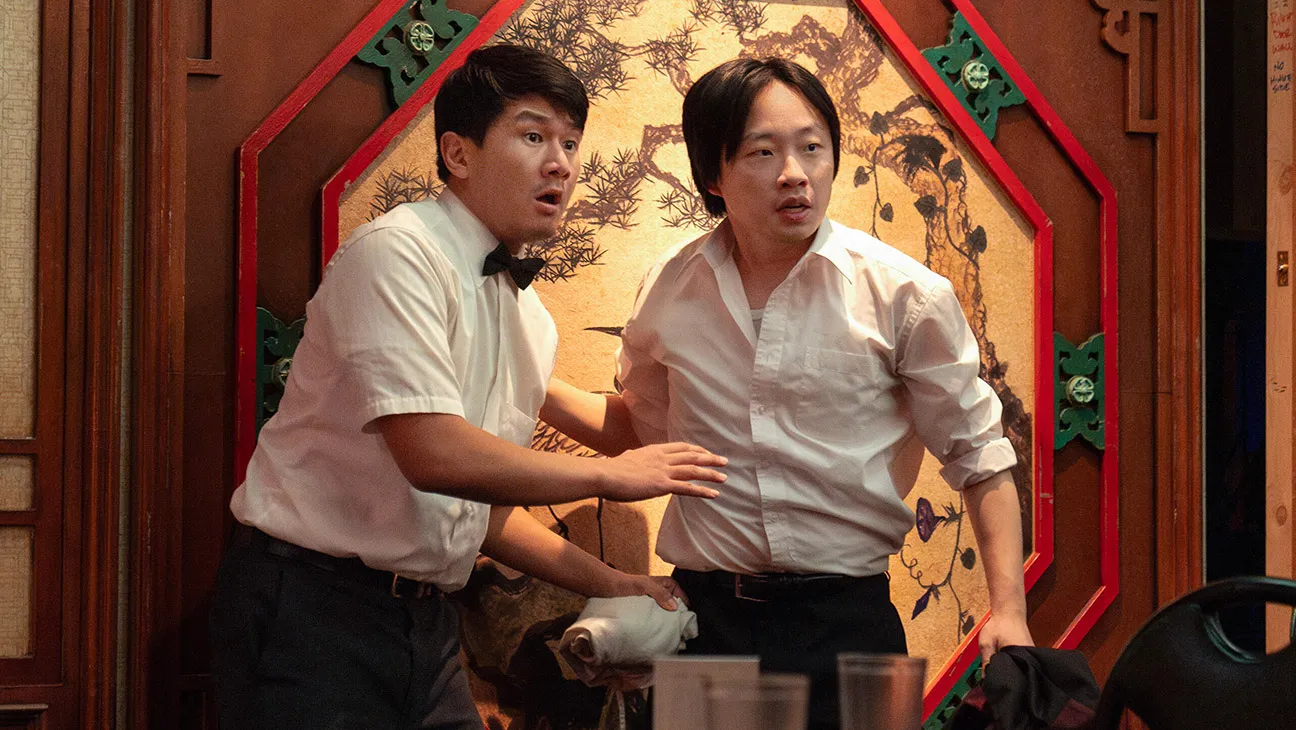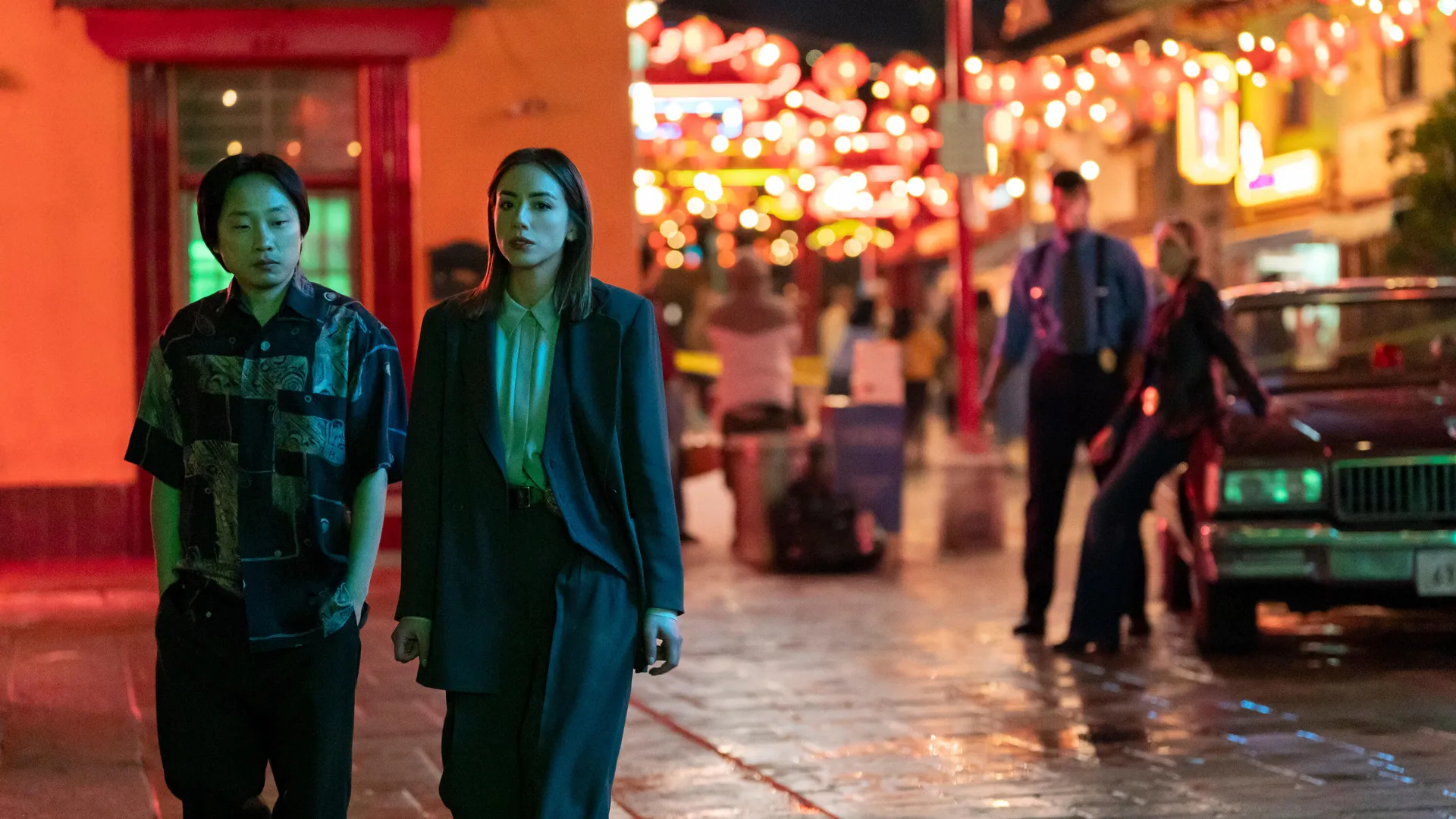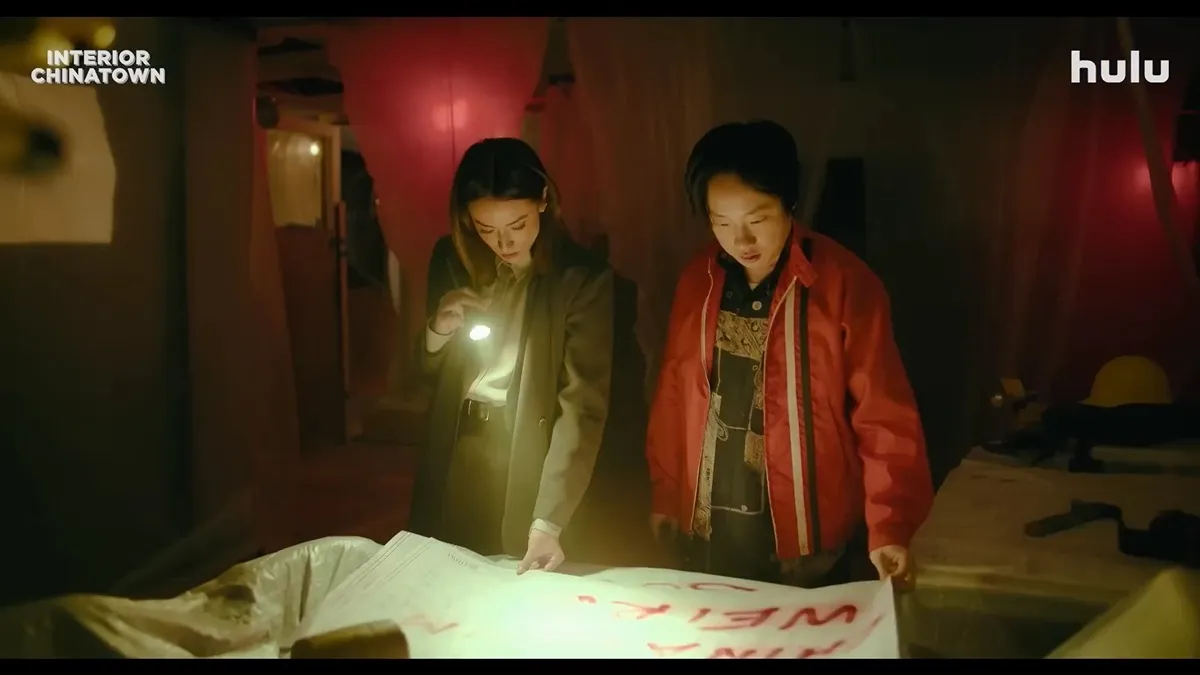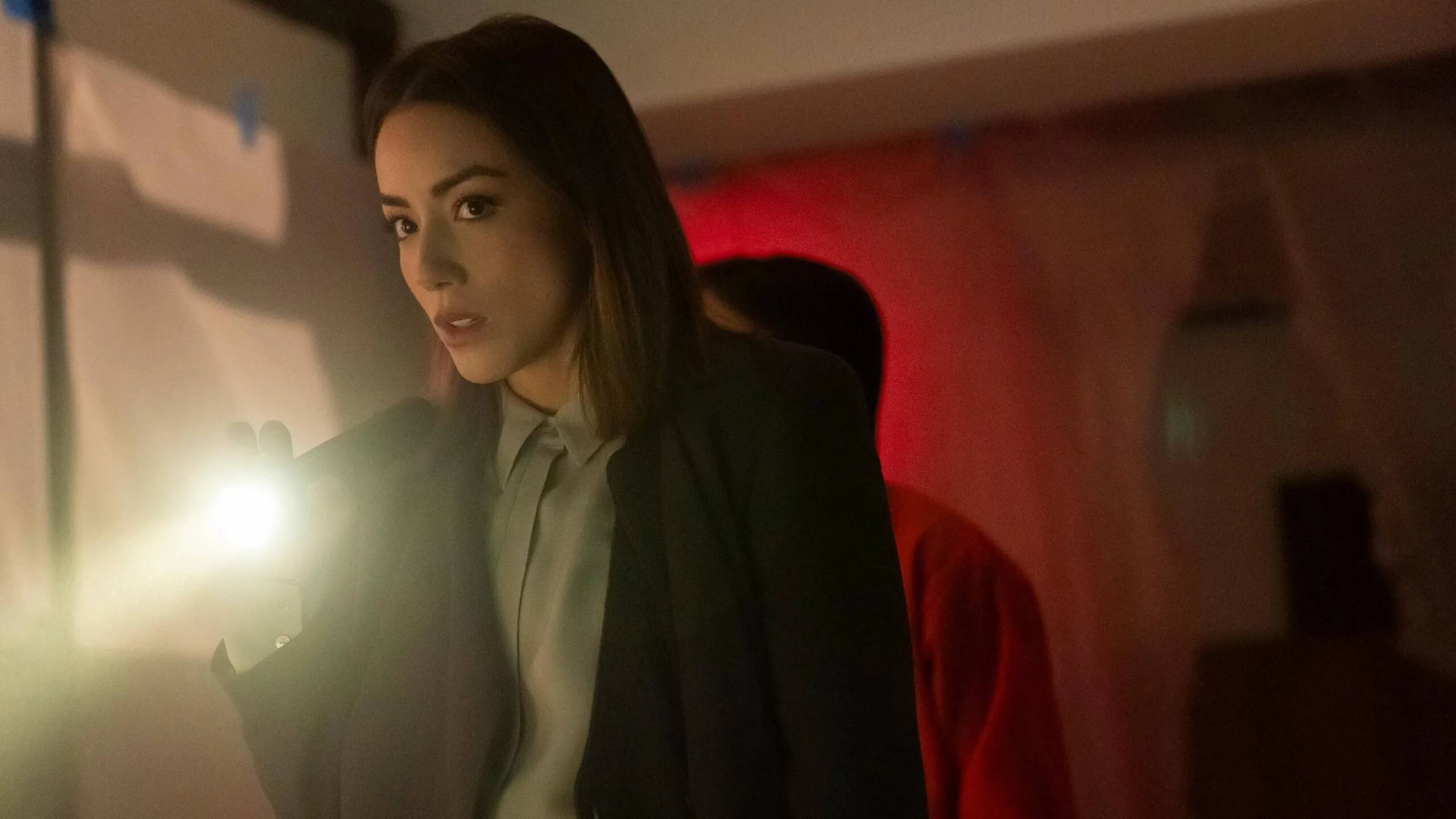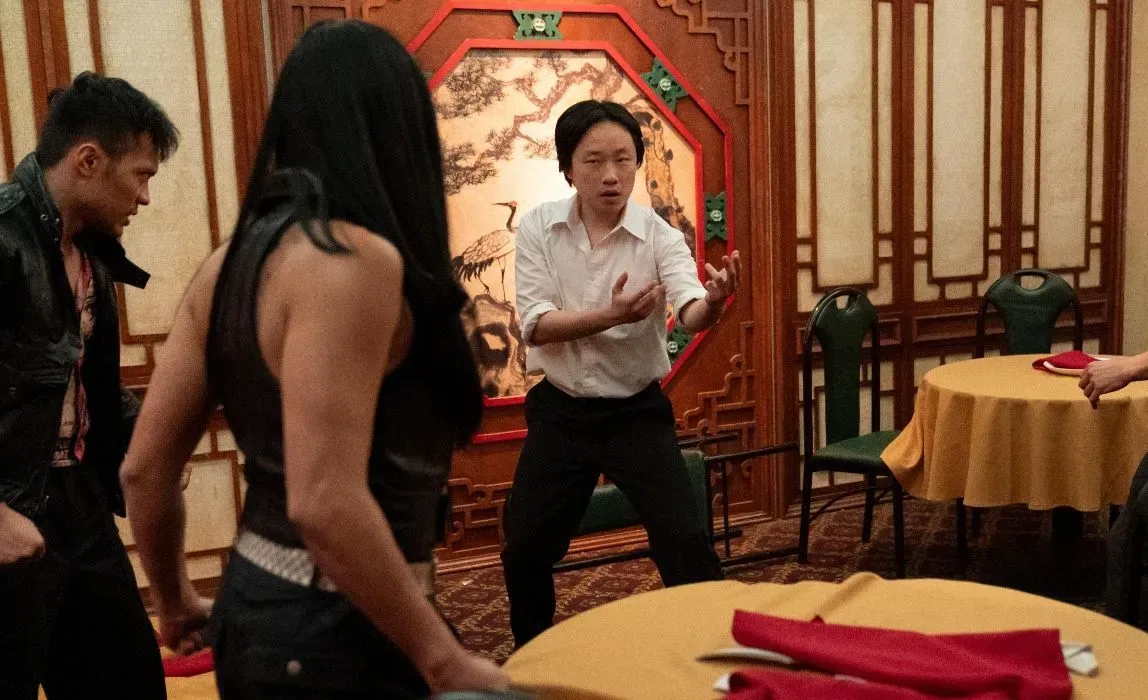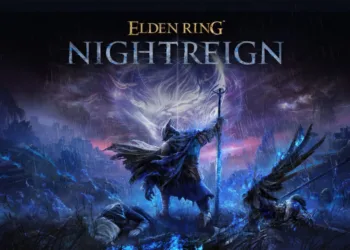Interior Chinatown is a groundbreaking TV show that breaks the rules of traditional storytelling. It turns the normal police procedural into a razor-sharp critique of how Asians are portrayed in media. Based on Charles Yu’s National Book Award-winning book, the show is about a waiter named Willis Wu (Jimmy O. Yang) who is always in the background of a made-up cop show called “Black & White.”
The show is a meta-narrative that looks at identity and questions the stereotypical roles that Asian characters usually play in Western entertainment. Willis is more than just a waiter; he’s a “Generic Asian Man” who wants to be the sought-after “Kung Fu Guy” and is desperate to break free from the limiting stereotypes that have shaped his life.
The clever idea of the show puts Willis in a world where he is both a character and an observer, navigating the artificial limits of a TV universe that erases and defines him simultaneously. When Willis sees a crime related to his long-lost brother’s strange disappearance, he finds an unexpected chance to go from being a background character to a possible main character.
With a strong cast that includes Chloe Bennet, Ronny Chieng, and talented directors like Taika Waititi, Interior Chinatown is more than just a show. It’s a satirical deconstruction of how media portrays culture, looking at identity, aspiration, and the invisible walls that keep marginalized stories from being heard.
The show will be more than just another TV show because it will mix genres and make sharp social criticism. It’s a cultural statement that needs to be seen and understood.
Breaking the Fourth Wall: A Narrative Revolution
Willis Wu lives in a very strange world. Behind the scenes of the made-up cop show “Black & White,” he is the perfect example of a “Generic Asian Man” who wants to be more. His most important dream? Becoming the famous “Kung Fu Guy” is a part that’s more than just a type of character; it’s a way to become important.
Wu’s life changes from passive watcher to possible protagonist when he sees a crime that has an unexpected link to his brother’s disappearance ten years ago. He works on the case with Detective Lana Lee, a character who is always on the edges of her own story, which takes him into Chinatown’s complicated criminal underworld.
The show does a stunning job of breaking down stories by effortlessly switching between truth and performance. One minute, you’re watching a normal police thriller, and the next, the whole structure changes, showing the fake rules that make up the characters and the story. It’s like watching a magic show where the performer shows you how the trick works on purpose, which makes it even more interesting.
Genre lines are always getting blurry. Willis could start out as a waiter, suddenly become a witness, and then maybe even a hero. All the while, the world around him follows set rules and plots. The investigation into the Painted Faces gang becomes more than just a crime case; it turns into a trip about breaking free from limiting roles.
This meta-narrative approach is boosted by Taika Waititi’s direction in the pilot, which uses lighting, cinematography, and tonal changes to show how fake stories are. The movie is a mix of thriller and social commentary, with sudden color changes, speech repetitions that surprise, and characters who know they are playing their “assigned” roles.
The show asks deep questions about Wu’s journey, such as, “Who gets to be the hero?” What makes someone a protagonist? How do cultural standards affect how we think about who we are?
Each show peels back another layer of the complex story world, revealing new information over time. The show doesn’t just tell a story; it questions how stories are told.
Shattering Stereotypes: Characters Beyond the Margins
Willis Wu isn’t just a character in the background; he’s a societal revolution ready to happen. Jimmy O. Yang plays Willis with great detail. He represents everyone’s desire to go beyond what they can do. He is both angry and hopeful at the same time. He is a waiter who wants to become the legendary “Kung Fu Guy” but has to deal with a world that keeps trying to label him as a stereotype.
Yang gives Willis just the right amount of comedic timing and emotional vulnerability. His performance shows the tension of someone who knows he’s on the outside but doesn’t want to accept that as his end destination. Willis has an infectious determination makes people want him to succeed, whether delivering food or trying to solve a case.
Detective Lana Lee, played by Chloe Bennet, turns out to be Wu’s surprise friend and possible love interest. She’s not your average routine detective—Bennet creates a character who is both tough and weak, always fighting against the story she already knows. Her battle is similar to Willis’s, making for a powerful dynamic between two characters trying to fit into a story that doesn’t usually include them.
The show’s comedic heartbeat is Ronny Chieng’s character, Fatty Choi. As Willis’s coworker and close friend, Chieng tells sarcastic jokes that hit hard and show deep cultural insights. His character isn’t just there to make you laugh; he’s a complex look at frustration at work and societal standards.
The Wu family, especially his parents, Lily and Joe, adds another depth. They represent what it’s like to be an immigrant: practical, sometimes mean, but mostly driven by love and survival. They talk to Willis about generational conflicts, cultural pressures, and the feelings that Asian-American families don’t talk about.
These characters stand out because they don’t let outside standards define them. Not only are they facing a criminal plot, but they are also breaking down systemic story limits one scene at a time.
Each character tells their own story, changing the plots that have left them out in the past. Interior Chinatown goes from being a simple police procedural to a deep look at identity, image, and how powerful it is to take control of your own story.
Rewriting the Script: Breaking Hollywood’s Invisible Barriers
Interior Chinatown is more than just a TV show; it’s a very sharp critique of how we portray things. The show changes the usual setting for stories into a playground where cliches are shown and taken apart individually.
The main idea of the show is to harshly question how Asian characters are often limited to set parts. Willis Wu starts out with the name “Generic Asian Man.” It turns out to be both a joke and a deep social analysis. He plays stereotypes like “Delivery Guy” and “Background Oriental Male,” each one is a suffocating box that says a lot about how Hollywood’s imagination has been limited in the past.
The meta-narrative turns into a strong tool. The sudden genre changes are amazing; one minute, you’re in a procedural drama, and the next, you’re in a strange look at cultural identity. Lighting changes, the rhythm of the conversation, and camera angles all become tools for deconstruction that show the made-up rules that make Asian characters invisible most of the time.
Willis’s story eventually involves choice. His goal to become the “Kung Fu Guy” is more than a personal goal; it’s a symbolic act of defiance against the way people are treated unfairly in society. He’s not just trying to get attention for himself; he’s also trying to change the system that has pushed him to the side.
Expectations from family members add another level of difficulty. As the show goes on, it looks at how immigrant families both support and limit their kids’ dreams. Cultural moments that people are used to, like parents making jokes about eating dinner or ginger’s healing properties, become nostalgic and funny.
The show’s method is what makes it great. That’s not all it does: it turns clichés into weapons. When humor is used as a surgical tool, it cuts through societal assumptions with heart and accuracy. Characters aren’t just fighting outside forces; they’re also fighting the stories telling them about their lives.
Interior Chinatown does something revolutionary by turning the police procedural genre into a meta-commentary: it gives voice to the voiceless by making background characters the main characters of their tales.
Staging Reality: Visual Alchemy of Interior Chinatown
Interior Chinatown’s visual scenery teaches how to break down a story. With his directing touch on the pilot, Taika Waititi creates a language for movies that is both familiar and new. The show doesn’t just tell a story; it breaks down the idea of storytelling with stunning visuals.
The cinematography takes on a life of its own. The lighting greatly changes between the fake world of “Black & White” and Willis’ real life, making clear visual lines that match the show’s meta-narrative style. One moment, the screen feels like a normal police procedure, and the next, it changes into a strange look at identity and how we are represented.
It’s amazing how well the production design creates the look of a studio backlot, making it hard to tell the difference between performance and real life. The artificial feel of the sets is on purpose, which adds to the show’s criticism of manufactured stories. The lighting in a theater creates a performative place where people are acting and being acted upon simultaneously.
The views of the camera become a way to tell a story. Viewers are constantly reminded that they are seeing a constructed reality through sudden changes in viewpoint, unexpected framing, and visual cues that refer to themselves. The camera is a character that makes people think about how stories are told and who gets to tell them.
What comes out isn’t just a style of art; it’s a new way of representing things, where every choice about technique is a statement about cultural identity, performance, and the power to control the story.
Performing Beyond Boundaries: Transformative Performances
Jimmy O. Yang doesn’t just play Willis Wu; he brings him to life with amazing accuracy. His show is a tightrope between comedy, vulnerability, and quiet drive. Yang does a great job of making Willis seem real, showing how tense it is for a character to be torn between societal standards and personal goals. He makes Willis both universal and unique at the same time, whether he’s being deadpan funny or handling a serious scene.
Detective Lana Lee, played by Chloe Bennet, comes as a surprise. She creates a character who is both tough and weak, which goes against the usual role of a procedural detective. With nuanced intelligence, Bennet handles Lee’s work problems and personal problems, making the character feel fully lived-in and real.
As Fatty Choi, Ronny Chieng steals almost every scene with his razor-sharp and deeply moving comedy. His performance goes beyond typical comedic relief; it adds layers of frustration at work and cultural complexity to every scene. The timing for the jokes is perfect, but what hits home is the humanity underneath.
Diana Lin and Tzi Ma, Willis’ parents, add more emotional depth. They’re not just supporting characters; they’re fully developed people who have been immigrants for generations. Their performances hint at unspoken histories, building a rich emotional landscape that goes beyond the story at hand.
Each actor is no longer just a performer; they are cultural storytellers who break down stereotypes with every small movement and strong word they say.
Reimagining Narratives: Beyond the Background
Interior Chinatown represents more than TV; it’s a cultural intervention. By changing how stories are usually told, the series offers a groundbreaking look at identity, representation, and the power of stories.
The show has some structural problems, but it has a deep message: the characters in the background have rich, complicated lives waiting to be understood. The ensemble cast, led by Jimmy O. Yang, makes a show that is funny, sad, and groundbreaking at the same time.
It’s not just another show. It asks us to rethink how stories are told, who gets to tell them, and the endless possibilities of characters usually on the edges. If you want to watch TV that challenges, entertains, and changes you, Interior Chinatown is a must. The story doesn’t just break the fourth wall; it rebuilds it completely.
The Review
Interior Chinatown
Interior Chinatown is a bold, genre-defying series that transforms the traditional television narrative into a razor-sharp commentary on cultural representation. Blending meta-humor, social critique, and genuine emotional depth, the show offers a unique viewing experience that challenges viewers' expectations. While not without minor structural inconsistencies, its innovative storytelling, powerful performances, and profound exploration of identity make it a landmark television moment. The series successfully deconstructs Hollywood stereotypes while celebrating the complexity of Asian-American experiences, proving that background characters can become the most compelling protagonists when allowed to tell their own stories.
PROS
- Innovative meta-narrative approach
- Powerful social commentary on representation
- Exceptional performances by Jimmy O. Yang and ensemble cast
- Unique blend of comedy and drama
- Groundbreaking exploration of Asian-American identity
- Creative visual storytelling
CONS
- Occasional pacing inconsistencies
- Some narrative threads feel underdeveloped
- Experimental style might challenge traditional viewers









































